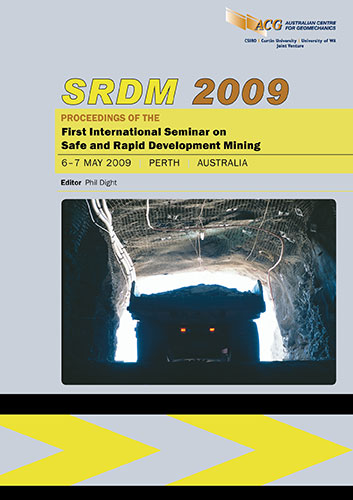The Svea tunnel — record performance in arctic conditions

|
Authors: Nilsen, F Paper is not available for download Contact Us |
DOI https://doi.org/10.36487/ACG_repo/902_19
Cite As:
Nilsen, F 2009, 'The Svea tunnel — record performance in arctic conditions', in PM Dight (ed.), SRDM 2009: Proceedings of the First International Seminar on Safe and Rapid Development Mining, Australian Centre for Geomechanics, Perth, pp. 207-211, https://doi.org/10.36487/ACG_repo/902_19
Abstract:
Improved access, reduced transport distance for coal and increased safety with regard to large ingress of water were the main arguments when Store Norske Spitsbergen Grubekompani As (SNSG) decided in 2002 to build a new access to the new coal mine Svea Nord. Existing access was a road built on the Høganes Glacier, ending at 330 m above sea level. The road had a bold alignment and placed great demands on the truck drivers as well as increasing snow clearing and road maintenance duties. Several alternatives were investigated and a decision taken to build a tunnel from Svea Vest at sea level to the lowest point in the Svea Nord mine at 285 m above sea level. The tunnel has a cross section area of 38.5 m2 and a length of 5630 m. The tunnel contains a conveyor for transporting coal from the mine to surface, and it is also used for mine ventilation purposes. The tunnel was awarded as a turnkey project to Leonhard Nilsen and Sønner As (LNS). Pre-cut work started in July 2002 and tunnel excavation started in November the same year. The breakthrough to the mine was blasted on December 3, 2003. The average performance was 103.3 m/week and the best week resulted in 150.1 m of tunnel. The average performance in the permafrost zone was 56.5 m/week and it was 108.5 m/week outside the permafrost frost zone.
© Copyright 2026, Australian Centre for Geomechanics (ACG), The University of Western Australia. All rights reserved.
View copyright/legal information
Please direct any queries or error reports to repository-acg@uwa.edu.au
View copyright/legal information
Please direct any queries or error reports to repository-acg@uwa.edu.au